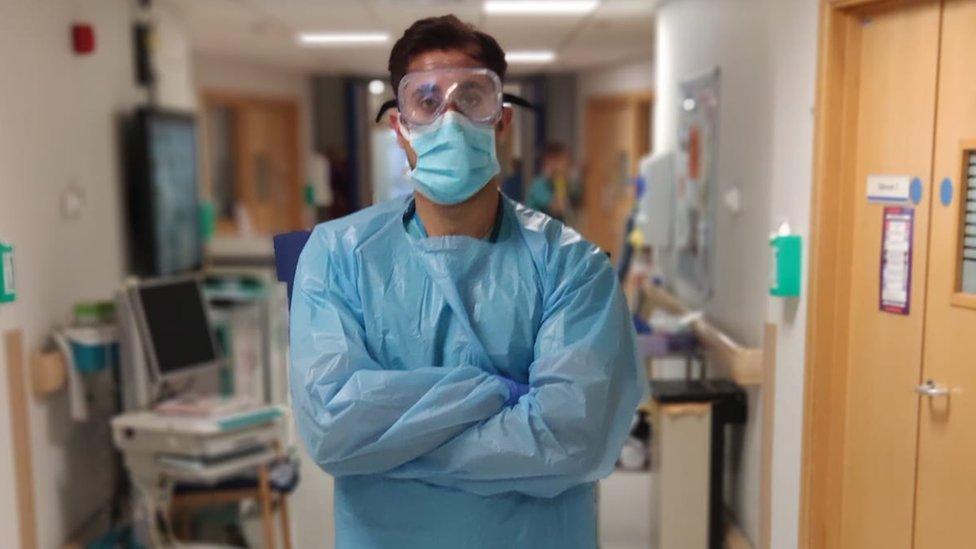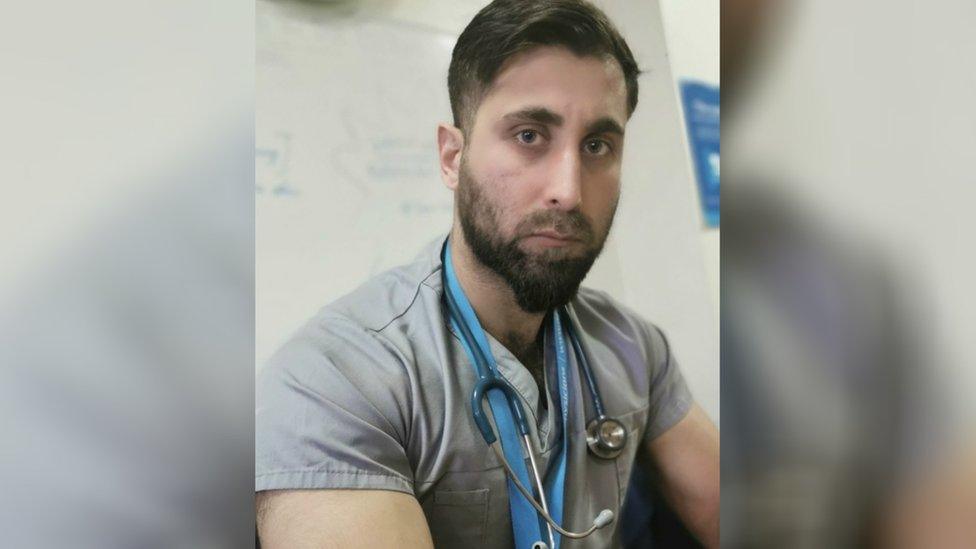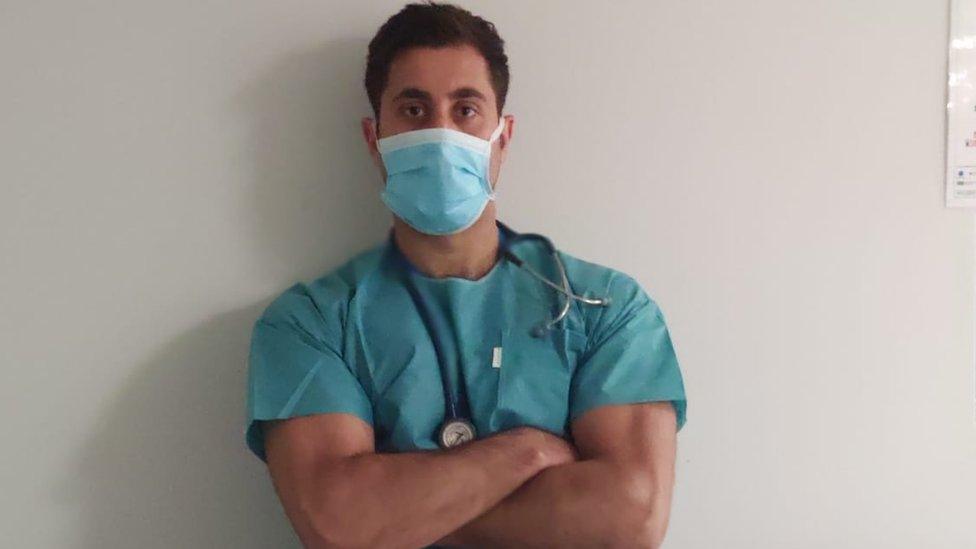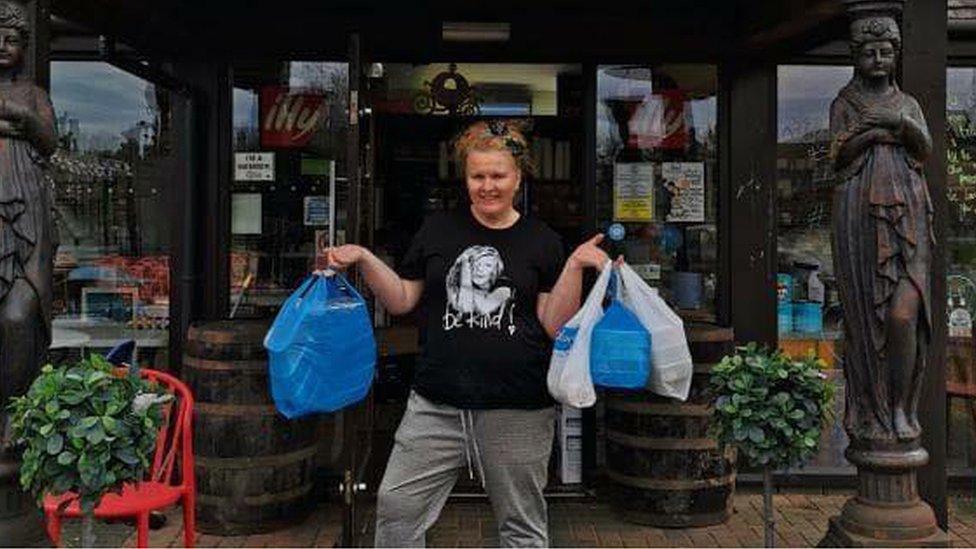Coronavirus: Newly-promoted NHS consultant says 'it's time to step up'
- Published

Dr Munaf started in his new position on Wednesday in Lincoln County Hospital
With the NHS facing mounting pressure during the coronavirus outbreak, many doctors, nurses and health workers are finding themselves being asked to step up in some way. One of them is Dr Asif Munaf, whose promotion to consultant has been fast-tracked - but he says he is looking forward to the challenge.
"It's what we have prepared for all our lives. We prepared for times like this," said Dr Munaf, whose first shift in his new role was on Wednesday.
The father-of-one has been promoted to consultant level a year earlier than planned with the single task of treating patients with Covid-19.
But Dr Munaf, who at the age of 31 believes he is one of the UK's youngest medical consultants, said he was "confident" in his new role.

Dr Munaf says he is "confident" after being promoted early to medical consultant level
"It's going to be quite intense, but I'm looking forward to the challenge," said Dr Munaf, who is based at Lincoln County Hospital, where has been working as a registrar for the past three years .
"It's a postman's job to deliver... it's a doctor's job to fight whatever [disease] is in front of them."
With all routine operations being cancelled for three months, Dr Munaf said many medics have changed and adapted to new roles as the NHS braced itself for a surge in cases.
Timelapse captures the transformation of London's ExCeL centre into the Nightingale Hospital
Daily tasks for Dr Munaf as a consultant will include assessing and carrying out procedures on patients in the Covid-19 isolation wards, as well as communicating with their family members.
Dr Munaf said even before he was made a consultant the amount of patients being treated with the virus had been "relentless" and he was shocked by how many adults, usually fit and healthy, had been "very unwell".
After his first shift in his new role, Dr Munaf told the BBC he had treated 28 patients, all with confirmed or suspected cases of Covid-19.
He said most of them were unwell but improving, three were "seriously unwell", and "one was dying".
The consultant said difficult decisions had to be made about the treatment of patients, including those who would be "made comfortable - an overused medical euphemism for being allowed to die" because of the severity of their medical condition and likelihood of survival.
Oxygen supply was not an issue at Dr Munaf's hospital, but he said the hospital was short on continuous positive airway pressure (CPAP) machines, with more of the devices, which deliver oxygen to the lungs without needing a ventilator, expected to arrive later this week.
Dr Munaf said part of his job was training surgically-trained nurses how to operate the CPAP machines they would need to use on surgical wards being converted into Covid-19 wards.

EASY STEPS: How to keep safe
A SIMPLE GUIDE: What are the symptoms?
GETTING READY: How prepared is the UK?
MAPS AND CHARTS: Visual guide to the outbreak
TRAVEL PLANS: What are your rights?
PUBLIC TRANSPORT: What's the risk?

To limit risk of infection Dr Munaf has been placed in a hotel away from his family, is required wear full personal protective equipment (PPE), and has had to shave off his beard "for the first time in 15 years".
"I look 10 years old now," he joked, but added he was concerned about the "lack of PPE across the NHS".

Dr Munaf is one of many health workers who have changed their roles during the coronavirus outbreak
He has not been alone in that concern and Dr Munaf told the BBC the PPE available to him and his colleagues was "exceedingly poor".
He said PPE was essential to protect staff during the crisis but said being covered up when treating patients was "dehumanising our approach".
"They feel like they are drowning and you cannot put a comforting hand on their shoulder," he said.
"You see the fear in their eyes. One of the biggest comforts to a patient is a doctor's touch."
Dr Munaf said despite expecting to face unprecedented pressures in his new role, he was "relishing the opportunity" to "really fight this pandemic".
"It's once in a generation, it's something we can tell our kids about. We were there," he said.
"It's time to step up. It's our time to shine."
- Published1 April 2020
